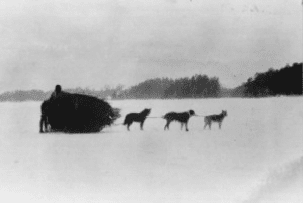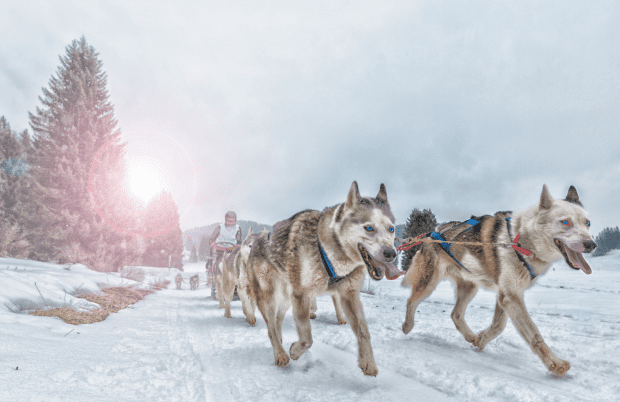Many consider it a blessing to live in a place with cold weather and snow. These glacially sculpted boreal forests we live among provide remote beauty and many different outlets and opportunities to get out and explore the deep winter. This perspective of gratitude for the winter and exploration is especially true for those that continue the tradition of covering country by way of a dog team. In this area, dog sledding is a way of life for many.
Dog sledding been a part of the Gunflint Trail for years. Originally, dog teams were used as work animals by Native Americans. They can cover huge distances, towing heavy loads. The dogs were helpful in hauling firewood, accompanying trappers in the fur trade, and even were used to deliver mail to the small towns and villages in the region long ago. The word “mush” comes from the French word, Marche.
The dogs love to run at full speed following the trails through the woods and across the frozen lakes. The Gunflint Mail Run Sled Dog Race evolved from the Can-Am Sled Dog Races on Devils Track Lake which took place in the early seventies. With the appeal of the expansive wilderness here and long distance possibilities, the idea for the race was born. The Mail Run Race is in cooperation with and under a special use permit from the US forest service. The Gunflint Mail race is a continuous race consisting of two legs of equal distance, separated by a mandatory layover. There are two different classes in the race. One is a 100 mile race that is run by 12 dog teams, and the other a 65 mile race that is run by 8 dog teams.
The 2023 race is scheduled for next weekend, Saturday January 7th. The start line is located at the Trail Center Lodge, 7611 Gunflint Trail in Grand Marais (also known as Cook County Road 12). Cell service is spotty, if any, in this area, so please keep that in mind. There is a visitors guide posted on the race website https:/ /gunflintmailrun.com with available amenities, resources and information. Even though the Gunflint Trail is technically part of Grand Marias, it’s far enough away from the big lake that it is usually colder and snowier. If you plan to check out the action, please be prepared and dress appropriately.
The first 12 dog team will leave the gate at 8am. There are 9 different mushers running 12 dog teams in the 100 mile race this year. Following their departure, the 8 dog teams will then take off from the same starting point around 9am. This year there are 17 8 dog teams running the 65 mile race. Mushers and teams will be coming from all over the country including as far as Alaska, as well as one team coming down from Ontario Canada.
Teams will start to make their way back to the Trail Center Lodge for a mandatory layover. The 8 dog teams will have a 3 hour mandatory layover and the 12 dog teams a 4 hour mandatory layover. After the mushers and teams are able to rest and be checked by the veterinary staff, they will head back out for the second leg of the trip in the late afternoon. All teams participating in the race will make their way back to Trail Center Lodge to the finish line Saturday evening and into Sunday’s early morning hours. The winners and awards will be presented later Sunday morning, but are not open to the public. The results will be posted on the Gunflint Mail Run website.

It is great to see the dogs take off, and out on the trail. Great views of teams will be available at the Trail Center Lodge, Big Bear Lodge, and Rockwood Lodge. Both Big Bear and Rockwood Lodge close between 5-5:30pm. Please refrain from bringing your own dog to the race. This can distract the teams and cause safety issues. Always use caution when approaching road crossings. Visitors are welcome to take pictures, although please do not use your flash, not only when the teams are running, but while the dogs are sleeping. This can distract them during the race and disturb them while they are trying to rest. Do not assume you can pet the dogs while they are resting. Mushers want their teams to stay focused and relax when they are supposed to. Be aware and give space to the dogs, mushers, handlers and veterinarians. Also, please be aware of loud noises and running children. This can cause distractions for the teams as well.
Here is a run down of how exactly this sport works with some musher terminology. Mushers will stand on what is called the runners of the sled. Runners are the two bottom pieces of the sled which come in contact with the snow. They extend behind the basket so the musher can stand on them. Runner bottoms are usually wood, covered with plastic or Teflon (in the past it was bone, antler, ivory or metal).
The Dogs are put in harnesses which help to efficiently distribute the weight of pulling, and then are attached to the sled by what is called a gang line. The dogs are attached by both a tug line (back) and a neckline (front). The dogs up front are called lead dogs. These dogs understand and take the musher’s voice commands such as Gee (turn right) or Haw (turn left). When teams pass each other you will hear the musher call “on by” signaling the dogs to pass the team ahead or a potential distraction. There can be one or two leads up front. The dogs behind lead are called point, or swing. The rest of the dogs are called team dogs until you get to the final pair located just in front of the sled. These dogs are called wheel dogs. Their job is to pull the sled out and around corners or trees. These dogs are often larger than the other dogs and take the greatest load when making turns or changing directions.
There are multiple brake systems on a dog sled. There is a metal claw attached to the back of the sled which digs into the snow when stood upon. This will cause the team to slow down or come to a complete stop. Once stopped, a large metal hook (snow hook) can be driven into the snow to anchor a team for a short period of time. If the Musher needs to keep the team stationary for longer periods of time, they will use ropes to tie off objects such as nearby trees.
If a dog is unable to complete the race and needs to be “dropped,” all mushers carry a dog bag that allows the dog to sit comfortably in the basket of the sled until they can make it to the next checkpoint where the dog will be left with the handler and receive any care/rest it needs.
There is an incredible team of dedicated veterinarians that will be present the entire time throughout the race. The Gunflint Mail Run rules were established to ensure the safety and health of the dogs. The veterinarian team examines all of the dogs, ensuring they are healthy before the race begins, are available if needed throughout the entire race should a dog become ill or injured while out on the trail, and check in with every dog during the mandatory rest period. They will also perform a final go through of each and every dog after they cross the finish line. While pulling a sled looks like hard work to us, to the dogs it is FUN! The vets present at the race have volunteered their time to be there for the love of these canine athletes. They put in long hours to make sure the dogs are healthy and well tended.
The mushers could not do this all on their own. There are so many important moving parts to be able to host and facilitate races like this. Each musher will have at least one handler. Handlers are a critical part of the sled dog team. They help to care for the dogs, feed the dogs, help get them to the starting gate, clean up after the dogs, and collect veterinarian samples.
There is always a need for volunteers every year. Some positions require previous experience, but many require no experience whatsoever. Some of the positions include: road crossing volunteers, start line volunteers, finish line volunteers, inside volunteers helping with musher check-ins, race stats, media coverage and more. If you would like to volunteer please contact Cathy Quinn at gunflintmailrunvolunteer@gmail.com.
If you are unable to attend the event and would like to know where the mushers are and how the race is going, you can follow on Twitter @GunflintMailRun or stay tuned to the Gunflint Mail Run Facebook page.
This race would not be possible without the following sponsors: Trail Center Lodge, Visit Cook County, Nace Hagemann Photography, Cedar Grove Veterinary Clinic, Grand Marais State Bank, Borderland Lodge, Rockwood Lodge and Outfitters, Cook County Whole Foods Coop, Nutri Source, Sisu+Loyly, Stone Harbor Wilderness Supply, Cook County Dog Mushers, Cook County Snowmobile Club, Fika Coffee, JR Designs, BWARC, Voyageur Brewing Company, and Rocksteady Running, as well as receiving donations. For many this truly is a once in a lifetime opportunity to witness such an incredible display of determination and strength of these powerful and resilient teams and the people that run with them. If you would like to consider a donation to the Gunflint Mail Run Sled Dog Race, please visit https://gunflintmailrun.com/ for more information.




